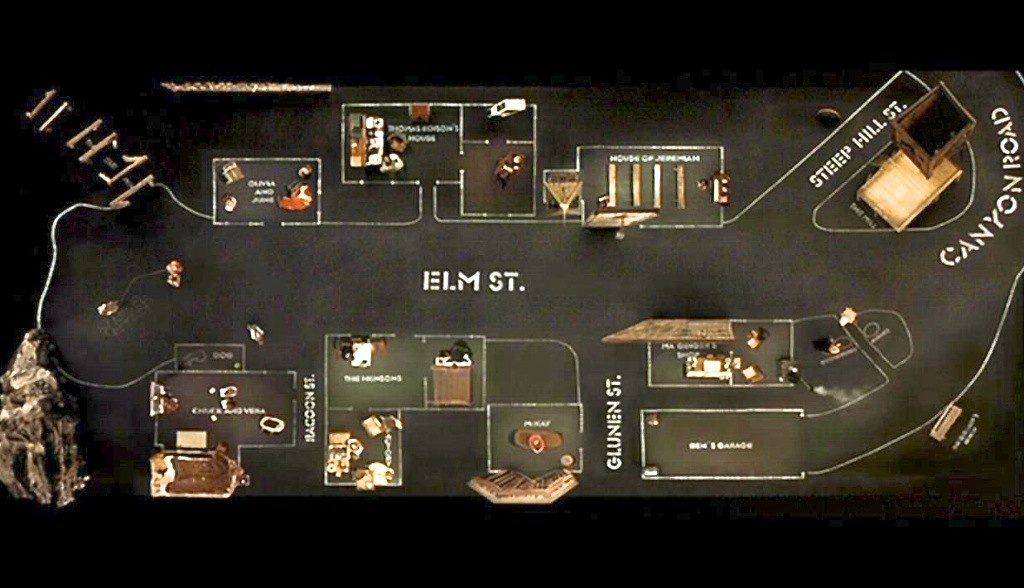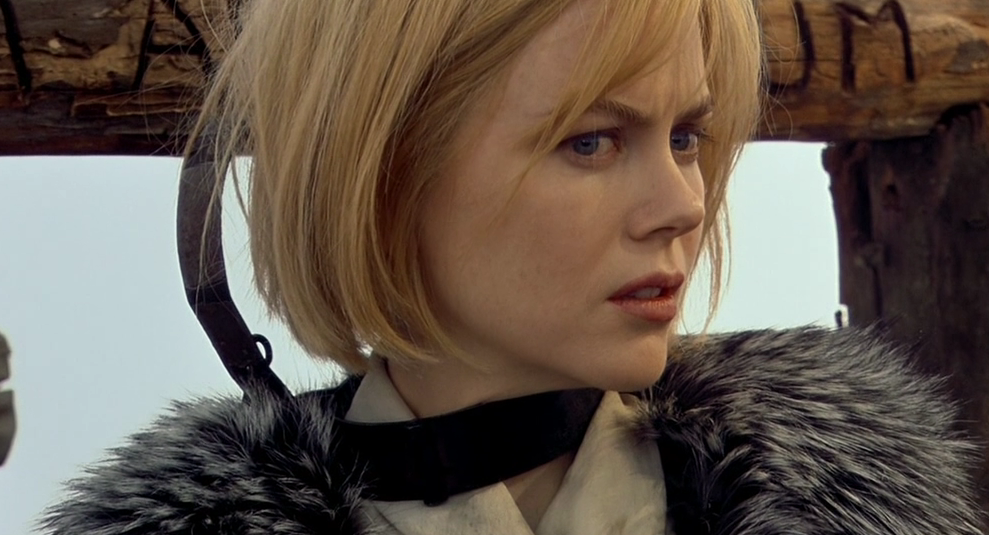Father: Rapists and murders may be the victims according to you, but I–I call them dogs. And if they’re lapping up their own vomit, the only way to stop them is with a lash.
Grace: But dogs only obey their own nature, so why shouldn’t we forgive them?
Father: Dogs can be taught many useful things, but not if we forgive them every time they obey their own nature.
The “dogs” of the Dogville are regular, decent people up until Grace (Nicole Kidman) flees from danger and seeks shelter. In return, she offers the help that they don’t need. Regarding where the situation leads up to; the main idea of the film suggested by the director is that evil can arise anywhere, as long as the circumstances are right.
The story is set in America’s Rocky Mountains during the Great Depression, but the actual setting is a giant sound stage. The street plan is marked in chalk, and the turning of doorknobs is mimed and accompanied by sound effect. In between invisible walls, everyone lives in isolation, but no one is ever alone. Simply because the setting is nowhere real, it has the potential to be everywhere. Remember the conversation when Tom tells Grace about the book he writes on Dogville; “Why not just call it Dogville?” Grace asks. “No, no,” he says, “it has to be universal. A lot of writers make that mistake.” Not Lars von Trier, though.

Dogville is the first film of the director’s America trilogy, and the statement on America is clearly intended as the film ends with photographs of America, accompanied by “Young Americans” by David Bowie. “Of course, it’s cheating a bit to put these pictures up, you might say,” he says. ”But I can’t deny that I am by heart a socialist, and therefore the American system as I see it would make a situation like this more probable, maybe push people more quickly to the wrong side. My primitive view is that if a system is partly built on the idea that you are the maker of your own happiness, then of course poor people are miserable in the sense that they failed completely. Whereas in other countries, you might look at that more as a failure of the society.’’
Although America has historically prided itself on giving shelter to the oppressed, the capitalist system first creates, then blames its victims. This reminds me of Trinh T. Minh-ha’s words from Reassamblage: “First create needs, then help.”
Yet, it is frequently noted that the director has never been to America. “I must say I’m very fond of this idea that Kafka didn’t go to America,” he says, “For me it’s about America, even though it’s about what he had seen in Europe. Somehow America is a canvas that you can use. Of course the film is, like Kafka’s book, inspired by my own meeting with not Americans but mostly Danish people. It could be a place anywhere.’’
Jack McKay, who is blind but is too vain to admit, is a metaphor of a nation without hope where light resembles the higher ideal. McKay tries to hide it by not leaving his house, and constantly speaking of the quality of light and the beauty it creates, even though the whole town knows that he cannot see. While he tries to fool the others along with himself, Grace “engages in a shady piece of provocation” and forces him to admit that he is blind. If the film aims to unravel a rotten America, Lars von Trier might have hinted his arrogant alter ego through Grace’s. The entrance to the mine reads “Dictum ac Factum”; “Sooner Said Than Done” which might refer to a disclaimer that it is easier to say than do.

Grace: So I’m arrogant. I’m arrogant because I forgive people?
Father: My God. Can’t you see how condescending you are when you say that? You have this preconceived notion that nobody, listen, that nobody can’t possibly attain the same high ethical standards as you, so you exonerate them. I cannot think of anything more arrogant than that. You… you forgive others with excuses that you would never in the world permit for yourself.
It is not an open one, but an allegory of Christianity can be found within the film, as well. “I deliberately took out religion,” Lars von Trier says in an interview; but the dog named Moses and Grace hinting “God’s Grace” are far from coincidence. Moses is unequivocal: Do not steal my bone and I won’t bite you. On the other hand, Grace is very much forgiving. She accepts everybody and everything no matter how far they take it. It all begins as she convinces Ben that it is not shameful to visit the whorehouse, and tells Chuck that his advance towards her is understandable and forgivable. Besides, this stems from her arrogance. The conscious of the citizens are muted in this overly accepting environment until it corrupts people to bring the worst in them.
We are used to children in films that represent the future generation and hope, but the main child character in Dogville builds up no hope; thus Grace finds salvation in erasing the whole town off the map. With shaky camera creating a documentary-like environment to authenticate the ideology, Dogville is brilliant.
